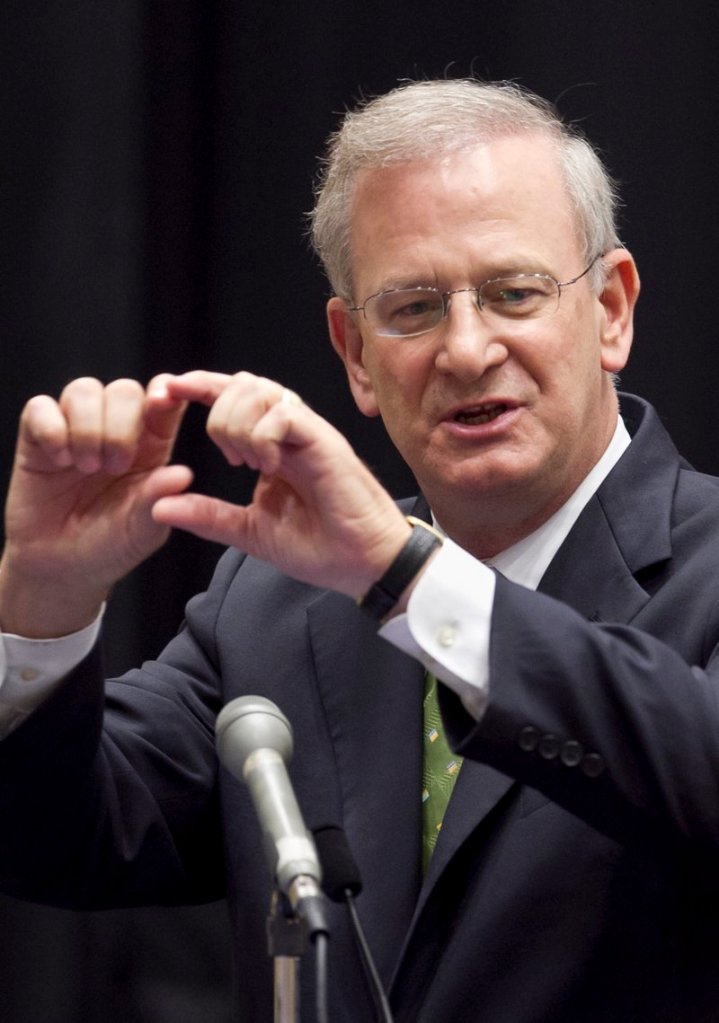WASHINGTON – When it comes to the economy, Thomas Hoenig seems more worried about the future than the present.
Hoenig, president of the Federal Reserve Bank of Kansas City, has been sending up flares all year that the Federal Reserve’s easy-money stance could hurt the economy down the road. His big concerns: keeping rates low will unleash inflation and spur new speculative bubbles.
And, he’s sticking to that stance even as the recovery has lost a lot of momentum. Concerns are growing among private economists that the economy could stall out, or worse, slide back into recession.
Hoenig, in a speech delivered Friday, suggested that those fears are overblown. As he sees it, the economy is growing modestly and has the “wherewithal to recover.” During recoveries, economic barometers often bounce up and down, he said.
While some private economists looking at recent economic data are seeing the glass as half empty, Hoenig views it more as half full. He points out that private companies have created 630,000 jobs so far this year. While that’s less than hoped for, it’s “positive nonetheless,” he said. He notes gains in manufacturing and Americans’ incomes over the last 12 months.
“While we are not where we want to be, the economy is recovering” and it should continue to grow over the next several quarters, he predicted.
For now, the economy still needs the support of ultra-low rates, he said. Interest rates have been at record lows near zero for nearly two years.
But he worries that keeping rates too low for too long could create problems later on. For instance, low rates could spur bubbles in the prices of commodities, bonds or other asset prices. Or, they could encourage people and businesses to take on too much debt again and overly leverage themselves, he suggested.
“If we again leave rates too low, too long out of our uneasiness over the strength of the recovery and our intense desire to avoid recession at all costs, we are risking a repeat of past errors and the consequences they bring,” Hoenig said in a speech in Lincoln, Neb.
Critics like Hoenig blame the Fed for keeping rates low for too long a period after the 2001 recession. Those low rates fed a housing bubble that eventually burst and plunged the economy into a severe recession in late 2007, they say.
“I believe that zero rates during a period of modest growth are a dangerous gamble,” Hoenig said.
That’s why Hoenig has dissented at all five Fed meetings this year. The latest one came Tuesday, when he broke from the Fed’s decision to take an unconventional step to strengthen the recovery by buying government bonds.
One of the many challenges of being a Fed official is having to make decisions on interest rates and other policy actions now — based on your best thinking of what the future will hold.
When James Bullard, president of the Federal Reserve Bank of St. Louis, looks ahead he worries that the weak recovery could push the United States into a deflationary period, like the “lost decade” Japan suffered through in the 1990s. Low rates help combat deflation, a widespread and prolonged drop in prices of goods and services, values of stocks and homes, and in wages.
Hoenig, however, said he sees “no evidence that deflation is the most serious threat to the recovery today.”
These differences of opinion within the Fed provide a glimpse of the challenge Fed Chairman Ben Bernanke grapples with as he tries to steer the economy into a sustained recovery.
Hoenig does acknowledge that the economy is going through “trying times” — especially with unemployment at 9.5 percent.
Low interest rates cannot solve every problem faced by the United States, he argued.
“In trying to use policy as a cure-all, we will repeat the cycle of severe recession and unemployment in a few short years by keeping rates too low for too long,” Hoenig, said. “I wish free money was really free and that there was a painless way to move from severe recession and high leverage to robust and sustainable economic growth, but there is no short cut.”
Send questions/comments to the editors.



Success. Please wait for the page to reload. If the page does not reload within 5 seconds, please refresh the page.
Enter your email and password to access comments.
Hi, to comment on stories you must . This profile is in addition to your subscription and website login.
Already have a commenting profile? .
Invalid username/password.
Please check your email to confirm and complete your registration.
Only subscribers are eligible to post comments. Please subscribe or login first for digital access. Here’s why.
Use the form below to reset your password. When you've submitted your account email, we will send an email with a reset code.